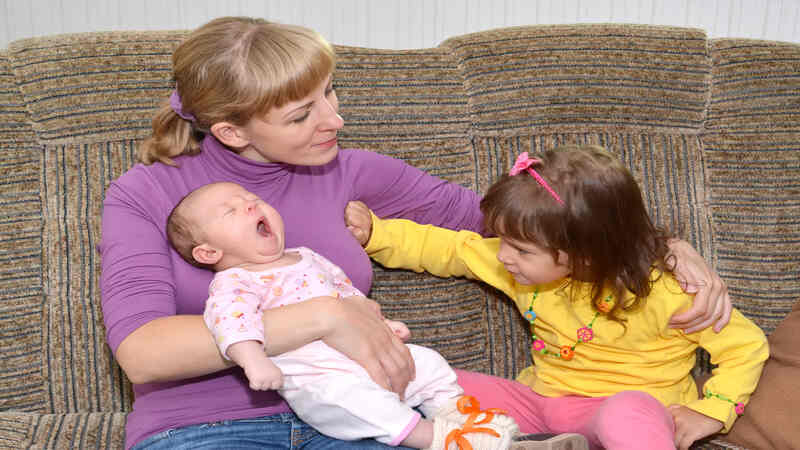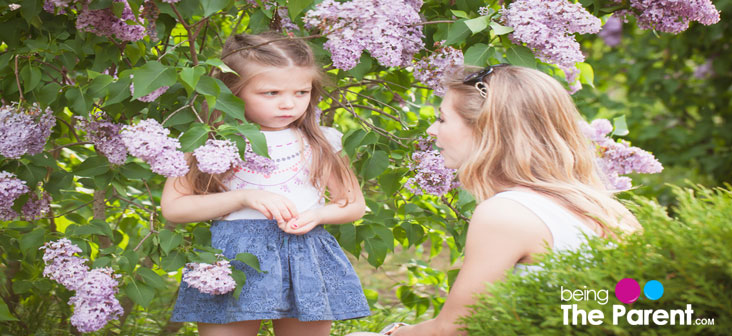
Do you notice that your attitude towards your second is very different from the one you had for your first? Do you think it goes beyond you being a more confident and experienced parent? And more importantly, do you think that your second child’s personality is being shaped by your parenting style? If you answered yes for any of the questions above, it is time to read up about the second child syndrome.
In This Article
- What is a Second Child Syndrome?
- Second Child Syndrome Signs and Symptoms
- Why Does Second Child Syndrome Happen?
- Do All Kids Suffer from Second Child Syndrome?
- What are the Second Child Traits?
- The Positives of a Second Child Syndrome
- Tips to Prevent Second Child Syndrome
What is a Second Child Syndrome?
The second child syndrome refers to characteristic changes in your second child’s personality and behavior as a result of the parent’s differentiating parenting style.
Second Child Syndrome Signs and Symptoms
Your second child might be showing these signs if they are suffering from second child syndrome. Look out for these and symptoms:
- Jealousy : Comparison between the two siblings might lead to jealousy and low self-esteem in the second child.
- Sibling rivalry: Constant comparison may lead to the siblings hating each other. The negative feelings may overshadow underlying sibling love.
- Becoming an introvert or extrovert: The low self esteem developed as a result of lack of attention from parents, may lead to them becoming an introvert. In some situations, they might throw tantrums and express their anger and irritability.
Why Does Second Child Syndrome Happen?
The experience of having your first child and second child is markedly different. When you were first pregnant, it was a much more overwhelming feeling and you tried to do everything right. You watched what you ate, and more importantly kept an eye out for things not to eat. And once the baby arrived, you were capturing every milestone (and more) with photographs and you were generally very protective of the child.
On the contrary, when you became pregnant for the second time, you were still happy, but the feeling was not as overwhelming as the first time. A “been there done that” feeling kicks in. You still try to follow all the rules, but you do not fret if you miss a dose of vitamins or if you do not go for a walk daily. The birth of the second child is definitely special, but not as exciting as the first time. In fact, you focus more on the older child (and rightly so) so that he/she does not feel left out. This laid-back attitude continues at every stage of the second child’s development. And research now shows that this “shapes” the second child’s personality.
Do All Kids Suffer from Second Child Syndrome?
Not all kids suffer from second child syndrome. But if there is extreme amount of partiality and favoritism from the parent’s side towards one child, then this issue crops up. However, at homes where all the kids are treated equally, second child syndrome is not seen. Also at homes where both the kids are of different gender then both of them are treated as “first born” because of differences in their characteristics and activities which will be first for the family. This factor will not lead to second child syndrome. Another factor that will make an exception to the second child syndrome is if the second child has any disability.
What are the Second Child Traits?

The following traits are generally as a result of the second child syndrome:
1. Indifference
Your second child feels that you like the first child more. Or, they understand that you do not have enough time for them, so you feel guilty. Second, children normally try to exploit this parent guilt by not responding positively to your affection. For instance, he might not hug you back when you hug him. Our advice? Do not let indifference stop you from being affectionate. Your child needs it more thaN they are willing to admit!
2. Trouble-Seeking
Getting into trouble on purpose or throwing a tantrum is their way of getting your attention. They would have noticed that you are too busy to take note of their good behavior, however you get upset and scold them when they behave badly. That’s attention! For this reason, second kids are more prone to be troublemakers. Do not feed into this attention-seeking behavior by reacting to it every time. However, be firm when things get overboard.
3. Negativity
Some experts feel that second children have a lot of anger and negativity suppressed inside them. Many at times, it might come out as sarcastic responses to things happening at home. Try to be patient in such situations and address the root cause, rather than reacting to the sarcasm.
4. Lacking in Ambitions
Your second child believes that you would ignore any of his achievements anyway, so there is no point in being ambitious and achieving heights.
5. Loner
Because of all the feelings he has endured as a child, it is highly likely that a second child might grow up to be a loner who might have problems having intimate relationships.

The Positives of a Second Child Syndrome
Everything, thankfully, is not bad. There are some positive aspects to second child syndrome too:
- You are a Less Fussy Parent: This is definitely a plus. First-time parents are very fussy and they normally say a lot “No don’t do it”. The second time around, parents are more relaxed and chilled out and as long as there is no physical harm, everything goes.
- Second Child is More Independent: Because of the fact that parents are less fussy and do not do helicopter parenting, second kids generally become more independent quickly.
- They are Calmer: Again, because they are not raised amidst a lot of rules and restrictions, they are calmer.
- Second Child is More Flexible: Since the second child is used to being by themself so they have the ability to adapt to any given situation. This makes him more flexible.
Tips to Prevent Second Child Syndrome
Right parenting and correct guidance from family and friends can help to overcome the second child syndrome to a great extent. Some of the tips to deal with this are:
1. Treat Equally
Do not compare your second kid by telling them that the older one is doing things better than them. Kids are very sensitive to comparisons so instead show them how to do things in the right way. Give them the learning time and proper feedback.
2. Do Not Over Pamper
While kids love being pampered by their parents but over pampering can do more harm than good. Your second child might feel left out if you over pamper your first kid and this could have a negative effect on them in the long run. So treat all your children the same way and make them independent.
3. Be a Listener, Not a Judge
Always give a listening ear to what your kid has to say. Just do not brush off their query or any enthusiasm that they may show. Growing up, the kids look up to their parents to support them and guide them in the right way. So never dismiss anything as unwanted or silly. Also while having family discussions, make sure you make an effort to pay attention and include your second child’s opinion.
4. Let Them be Different
If your first child is good at something like a sport or an activity, do not pressurize your second child to follow the older one’s footsteps. Every kid is different and has their own strengths and weaknesses. Putting the second child through all this will bring their morale down and also kill their self-esteem. Be a supportive parent and allow them to choose their own path and guide them along the way.
5. Help Them Love Their Siblings
Helps your second child to learn to love their siblings. Help them play or work together so that they understand each other. Also instil the confidence in the second child that their sibling is not always at an advantage and all your children are special and unique. This will help them bond better with their siblings.
6. Teach Them to Share
As the second child does not get all the time with you, talk to them and explain to them why that doesn’t happen. Communicate with them and try to understand their fears. Make them understand that you can’t always be present for them and at times they would have to learn to do without you as their sibling will need you more. Let them always know and understand why you do, what you do etc.
Hope this article helped you to understand the second child syndrome in a better way and gave you enough tips to overcome this. If you have any suggestions or experiences, please share in the comments section below.
